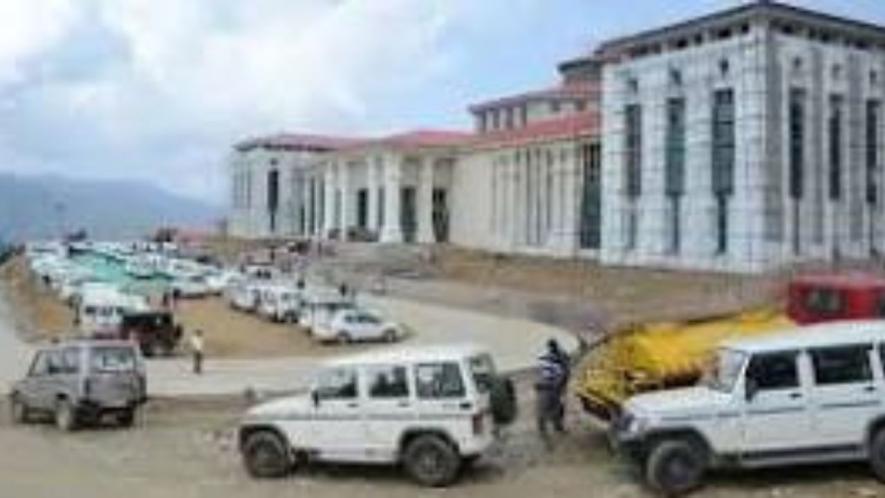Uttarakhand: Amid Natural Disasters, BJP Govt to Bring Anti-Minority Bills in Monsoon Session

Gairsain Assembly building in Chamoli district of Uttarakhand.
Dehradun: The state of Uttarakhand, during the current monsoon season, is facing rain-related natural disasters, the worst after the 2013 Kedarnath disaster that crippled life, particularly in the hills, with roads and bridges affected by landslides. The ‘Char Dham’ yatra, the mainstay of Garhwal’s economy remains suspended due to fractured roads following continuous heavy rains.
The Dharali incident in Uttarkashi district, where nearly a hundred persons perished in the deluge on August 5, destroying homes and hotels, along with death and destruction in other parts of the state have alarmed environmentalists and even common persons living the hills about the need for accountable and sustainable development. There have been demands from all stakeholders in the Himalayas for a complete relook at the development strategy for the Himalayan states which have been facing frequent natural disasters
In the present backdrop, the Monsoon Session of the Uttarakhand Assembly starts on Tuesday, August 19, 2025, at the summer capital of Gairsain in Chamoli district. Interestingly, Bharatiya Janata Party (BJP) government, led by Chief Minister Pushkar Singh Dhami, who is emerging as a hard ‘Hindutva’ icon of the Sangh Parivaar has again resorted to his time-tested anti-Muslim rhetoric.
The state government proposes to bring two Bills in the Monsoon Session, namely, Uttarakhand Minority Educational Institutions Bill, 2025, and the Freedom of Religion (Amendment) Bill, 2025, with stricter provisions. The state cabinet passed these Bills at a meeting held a few days ago.
As per the provisions of the Uttarakhand Minority Educational Institutions Bill, 2025, The Uttarakhand Madrasa Education Board Act, 2016 and the Uttarakhand Non-Government Arabic and Persian Madrasa Recognition Rules, 2019, will stand repealed from July 1, 2026.
In the past few months, the BJP government in Uttarakhand has started a tirade against Muslim ‘Madrassas’ (religious schools), closing and sealing many of these. There are more than 450 ‘Madrassas’ in the state, mainly in Haridwar, Udham Singh Nagar and Dehradun district, with a sizable Muslim population.
On the face of it, and as per the claims of the state government, the proposed law seeks to extend the benefits of ‘Minority Educational Institution’ status to the minority communities other than Muslims, such as Sikhs, Christians, Buddhists, Jains and Parsis.
The new law proposes the establishment of an Authority -- Uttarakhand State Authority for Minority Education -- to grant the status of minority educational institutions. It includes mandatory recognition - any educational institution established by Muslim, Christian, Sikh, Buddhist, Jain, or Parsi communities must obtain recognition from the proposed Authority to qualify as a minority educational institution’.
The minority educational institutions must be registered under the Societies Act, Trust Act, or Companies Act to get recognition. Recognition can be withdrawn in cases of financial mismanagement, lack of transparency, or activities against religious and social harmony. Ownership of land, bank accounts, and other assets must be in the name of the institution.
As per the state government, the proposed Authority will ensure that education is imparted in accordance with the standards set by the Board of School Education, Uttarakhand, and that student evaluations remain fair and transparent.
The law introduces significant changes for minority community institutions in Uttarakhand by establishing a transparent process for their recognition. The officials claim that the law would ensure quality of education while protecting the constitutional rights of minorities.
Additionally, the state government gains the authority to monitor the functioning of these institutions and issue necessary directives as needed. The law would permit the study of Gurmukhi and Pali also in recognised minority educational institutions. Chief Minister Dhami has claimed that it was a “progressive law” and a “first in the country that would bring transparency and equality.”
Muslim Community Apprehensive
But the Muslim community, which is bearing the brunt of the present BJP government in the shape of ‘Love Jihad’, ‘Land Jihad’, ‘Mazar Jihad’ and ‘Thook Jihad’, economic boycott and are being targeted throughout the state, have termed the Bill as another attempt by BJP government to target Muslims to polarise and appease the majority upper caste Hindu population of the state.
Hafiz Shanazar, a spokesperson of the Jamait-e-Ulema-e-Hind claimed that this was another attempt to target Muslims and their educational Institutions. “We are waiting to know the full details of the Bill that will be presented in the Assembly and then we will react,” he added.
As per the Bill, the proposed Authority will ensure that education is imparted in accordance with the standards set by the Board of School Education, Uttarakhand. “This means that minorities would not be able to impart religious education in their Madrassas and will have to follow Uttarakhand Education Board curriculum. Majority of the Madrassas are already adhering to the Uttarakhand Education Board curriculum besides religious education,” said Shahnazar.
Muslims form the biggest minority group in the state with 13.95% population, as per state government data, followed by Sikhs at 2.34%, as per the 2011 Census. Christians make for 0.37%, Buddhists - 0.15% and Jains-0.09% of the state’s total population.
Suryakant Dhasmana, senior vice-president and organisational secretary of Uttarakhand Congress alleged that these were attempts by BJP to polarise the society.
“After facing defeat in the recent panchayat polls, BJP has again embarked on its strategy to target the minorities, particularly Muslims. Instead of coming up with a comprehensive strategy to deal with the ongoing natural disaster, the state BJP government is trying to deflect the attention of the people,” Dhasmana said.
He further said that most of the Christian, Sikh and Muslim educational institutions were operating in Uttarakhand for the past more than a century with distinction and as per prevalent law and statute.
“I wonder how the Chief Minister will force all the minority educational institutions to follow the Uttarakhand School Board curriculum, as some schools follow CBSE and other ICSE patterns,” he added.
The second Bill -- Freedom of Religion (Amendment) Bill, 2025 --proposes to make the state's existing anti-conversion law more stringent, which allows jail sentences ranging from three years to a life term for persons found guilty of “forced conversions”. Previously, the maximum jail term for a “forced conversion” was 10 years. These provisions are not there in any of the BJP-ruled states which had enacted anti-conversion laws, not even in neighbouring Uttar Pradesh ruled by Yogi Adityanath, a Hindu hardliner.
The Freedom of Religion Act in Uttarakhand was introduced in 2018 and the Act was first amended in 2022. Attempts to convert a person into another religion with the lure of jobs, money, or other “gifts” would be considered a forced conversion. “Promises of a better life, or free education in a school or college maintained by a religious institution prior to religious conversion will attract a punishment of three to 10 years. Mass conversions, and conversion activity with foreign funding will attract punishment from seven to 14 years. Persons found guilty of the forcible conversion of a woman, child, an individual belonging to a SC (Scheduled Caste)/ ST (Schedule Tribe) community, or a person with disability can get a jail term of five to 14 years.”
The Bill defines “allurement” as “any gift, gratification, easy money or material benefit, whether in cash or kind, employment, or by invoking divine displeasure”. Human trafficking, and threat to life attract jail terms from 20 years to life under the 2025 Bill.
The accused can be booked for “false promises of marriage”. Hiding one’s religion with the intention of marriage could attract imprisonment from three to 10 years, and a fine of ₹3 lakh. “Speaking ill of one religion and praising another, and propaganda on social or digital media would also be considered participation in religious conversion.”
The amended Bill authorises District Magistrates to confiscate properties “acquired from a crime related to religious conversion”. Claims to legitimate ownership would have to be proved. The accused persons may be arrested without a warrant, according to the 2025 Bill, and bail granted only if the court were convinced that the accused was not guilty, and would not commit such crime again
The writer is a freelance journalist based in Dehradun, Uttarakhand.
Get the latest reports & analysis with people's perspective on Protests, movements & deep analytical videos, discussions of the current affairs in your Telegram app. Subscribe to NewsClick's Telegram channel & get Real-Time updates on stories, as they get published on our website.
























